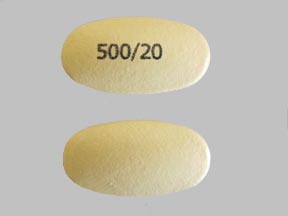Esomeprazole / Naproxen Dosage
Medically reviewed by Drugs.com. Last updated on Aug 11, 2023.
Applies to the following strengths: 20 mg-375 mg; 20 mg-500 mg
Usual Adult Dose for:
Usual Pediatric Dose for:
Additional dosage information:
Usual Adult Dose for Ankylosing Spondylitis
One tablet (esomeprazole 20 mg-naproxen 375 mg or esomeprazole 20 mg-naproxen 500 mg) orally twice a day
Comments:
- Not interchangeable with the individual components of naproxen and esomeprazole magnesium.
Uses: For the relief of signs and symptoms of osteoarthritis, rheumatoid arthritis, and ankylosing spondylitis and to decrease the risk of developing gastric ulcers in patients at risk of developing nonsteroidal anti-inflammatory drug (NSAID) associated gastric ulcers
Usual Adult Dose for Osteoarthritis
One tablet (esomeprazole 20 mg-naproxen 375 mg or esomeprazole 20 mg-naproxen 500 mg) orally twice a day
Comments:
- Not interchangeable with the individual components of naproxen and esomeprazole magnesium.
Uses: For the relief of signs and symptoms of osteoarthritis, rheumatoid arthritis, and ankylosing spondylitis and to decrease the risk of developing gastric ulcers in patients at risk of developing nonsteroidal anti-inflammatory drug (NSAID) associated gastric ulcers
Usual Adult Dose for Rheumatoid Arthritis
One tablet (esomeprazole 20 mg-naproxen 375 mg or esomeprazole 20 mg-naproxen 500 mg) orally twice a day
Comments:
- Not interchangeable with the individual components of naproxen and esomeprazole magnesium.
Uses: For the relief of signs and symptoms of osteoarthritis, rheumatoid arthritis, and ankylosing spondylitis and to decrease the risk of developing gastric ulcers in patients at risk of developing nonsteroidal anti-inflammatory drug (NSAID) associated gastric ulcers
Usual Pediatric Dose for Juvenile Idiopathic Arthritis
12 years or older:
- At least 38 kg to less than 50 kg: One tablet (esomeprazole 20 mg-naproxen 375 mg) orally twice a day
- Greater than 50 kg: One tablet (esomeprazole 20 mg-naproxen 375 mg or esomeprazole 20 mg-naproxen 500 mg) orally twice a day
Comments:
- Not interchangeable with the individual components of naproxen and esomeprazole magnesium.
Use: For the relief of signs and symptoms of juvenile idiopathic arthritis and to decrease the risk of developing gastric ulcers in patients at risk of developing NSAID associated gastric ulcers
Renal Dose Adjustments
Moderate to severe renal impairment (CrCl less than 30 mL/min): Not recommended
Liver Dose Adjustments
Mild to moderate liver impairment: Monitor closely and consider possible dose reduction based on the naproxen component
Severe hepatic impairment: Use should be avoided
Dose Adjustments
Elderly Patients:
- Use caution when high doses are required; the lowest effective dose should be used due to an increased risk for adverse events and increased likelihood of concomitant renal or hepatic impairment and cardiac dysfunction.
Precautions
US BOXED WARNINGS: RISK OF SERIOUS CARDIOVASCULAR AND GASTROINTESTINAL EVENTS:
- Nonsteroidal anti-inflammatory drugs (NSAIDs) cause an increased risk of serious cardiovascular (CV) thrombotic events, myocardial infarction and stroke, which can be fatal. This risk may occur early in treatment and may increase with duration of use.
- This drug is contraindicated in the setting of coronary artery bypass graft (CABG) surgery.
- NSAIDs cause an increased risk of serious gastrointestinal (GI) adverse events including bleeding, ulceration, and perforation of the stomach or intestines, which can be fatal. These events can occur at any time during use and without warning symptoms. Elderly patients and patients with a prior history of peptic ulcer disease and/or GI bleeding are at a greater risk for serious GI events.
Safety and efficacy have not been established in patients younger than 12 years or less than 38 kg.
Consult WARNINGS section for additional precautions.
Dialysis
Data not available
Other Comments
Administration advice:
- Take at least 30 minutes prior to a meal.
- The tablet should be swallowed whole with liquid; do not split, chew, crush, or dissolve tablets.
- If a dose is missed, it should be taken as soon as possible; however, if the next scheduled dose is due, do not take the missed dose and take the next dose on time; do not take 2 doses at one time.
- Antacids may be used while taking this drug.
General:
- The benefits versus risks ratio of esomeprazole-naproxen therapy should be assessed prior to commencing treatment and the lowest effective dose for the shortest duration possible employed.
- This drug does not allow for a lower daily dose of esomeprazole; if a lower daily dose of 40 mg is appropriate, a different treatment should be considered.
- Prior to commencing esomeprazole-naproxen, existing treatment with non-aspirin NSAIDs (including COX-2 selective inhibitors) and gastroprotective medications (such as proton pump inhibitors or H2 receptor antagonists) should be ceased.
- Esomeprazole-naproxen is not recommended for initial treatment of acute pain.
Monitoring:
General: Regular surveillance is recommended in patients on long-term treatment, e.g., those treated for more than one year.
Cardiovascular: Blood pressure, myocardial infarction and stroke (particularly in patients with cardiovascular disease or cardiovascular risk factors)
Hematologic: Clinically significant bleeding from any source
Hepatic: Liver function tests, particularly ALT levels.
Renal: Renal function (serum creatinine and/or creatinine clearance)
Patient advice:
- Patients should be cautioned against driving or operating machinery until they are reasonably certain that esomeprazole-naproxen will not adversely affect their ability to safely engage in such activities.
- Patients should talk to their health care provider if they are pregnant, planning to become pregnant, or breastfeeding; NSAIDs should not be used at 20 weeks or later in pregnancy unless specifically advised to do so by their health care professional.
More about esomeprazole / naproxen
- Check interactions
- Compare alternatives
- Pricing & coupons
- Reviews (60)
- Drug images
- Side effects
- During pregnancy
- Drug class: Nonsteroidal anti-inflammatory drugs
- En español
Patient resources
- Esomeprazole and naproxen drug information
- Naproxen and esomeprazole (Advanced Reading)
- Naproxen and Esomeprazole
Other brands
Professional resources
Other brands
Related treatment guides
Further information
Always consult your healthcare provider to ensure the information displayed on this page applies to your personal circumstances.


